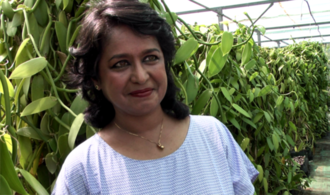Plant-based medicine & traditional knowledge: Interview with Ameenah Gurib-Fakim
Written by Modified on the
During her visit to the Plant Protection Centre in Saint-Pierre in the context of the EDF Biodiversity Project (European Development Fund), Mauritian researcher Ameenah Gurib-Fakim granted us an interview about biodiversity and phytotherapy.
Commander of the Order "Star and Key of the Indian Ocean", honoris causa Doctor of the Pierre and Marie Curie University, winner of the 2007 L'Oreal UNESCO award... Professor Ameenah Gurib-Fakim is well-known in environment research in the Indian Ocean. Born in Mauritius, she is a great example of female success in the world of scientific research.
"Knowledge of plants is dwindling"
On her return from her studies in England, Gurib-Fakim, a trained chemist, literally fell in love with the amazing diversity of plants in her native island. In 1994, while compiling an inventory of aromatic and medicinal plants of Mauritius and Rodrigues, a harsh conclusion had to be faced: with globalization, the transmission of traditional knowledge of medicinal plants had begun to die out. If the loss of this ancient knowledge was bad enough in itself, it might lead to the abandonment of once-useful plants.
Traditional medicinal plants and cultural knowledge are intimately linked. The loss of one is likely to result in the loss of the other. Neglected by generations who see only weeds and grandmother’s remedies, these local plants may soon simply disappear. Yet, many of them have interesting and useful properties. Aloe vera (called bitter aloe in Réunion) is one of the best known examples. This plant, with its recognizable succulent leaves, gives a gel with healing and anti-stinging qualities and has been grown since ancient times for its therapeutic properties. These days, it is heavily marketed we can find Aloe vera in a large variety of shampoos and hair removal creams.
"Discrediting herbal medicine is a little hypocritical"
Whether extracted or synthesized chemically, a large part of the molecules present in modern pharmaceuticals come from plants. Acetylsalicylic acid, the active ingredient of aspirin, is a compound present in the bark of the white willow (Salix alba) whose healing properties were already known to Hippocrates in the fourth century BC. This is just one example, among many, of the usefulness of plants.
To prevent plants from disappearing, in 2009 Gurib-Fakim created the Phytotherapy Research Centre (Cephyr). The aim of the center is to promote the preservation of these valuable medicinal resources and study the active ingredients that give them their therapeutic properties and, if necessary, to promote them.
"Discrediting herbal medicine is a little hypocritical.
All researchers know that nearly all modern medicine derives from it.”
"More needs to be done, especially in the area of education."
”However, for Ameenah Gurib-Fakim, most of the work still to be undertaken is not in natural parks or conservation centers. It is educating future generations in the hope that they will save biodiversity. It is imperative that mankind learns to live sustainably through a sustainable and rational use of resources. This can only be learnt through education!
"In Mauritius we started creating conservation areas within our National Park,
but [...] more needs to be done, especially educating our young people.
They will one day be in charge.”
"Without science there is no development."
These strategies remain to be implemented. According to Gurib-Fakim, science has the ability to enable such changes. The research community needs to be more proactive, and with the help of people and well though-out policies, enter the twenty-first century in a more elegant way than what we have achieved over the last 14 years.
"Without science there is no development. [...]
Scientists tend to stay in their ivory tower, not communicating.
They do good work, but without partnerships there will be no development."
The video of our interview with Ameenah Gurib-Fakim :
For more information about Cephyr :
- Web site of Cephyr : www.cephyr-recherche.com
- Article on the entrance of Cephyr among the partners of the project Germination :


